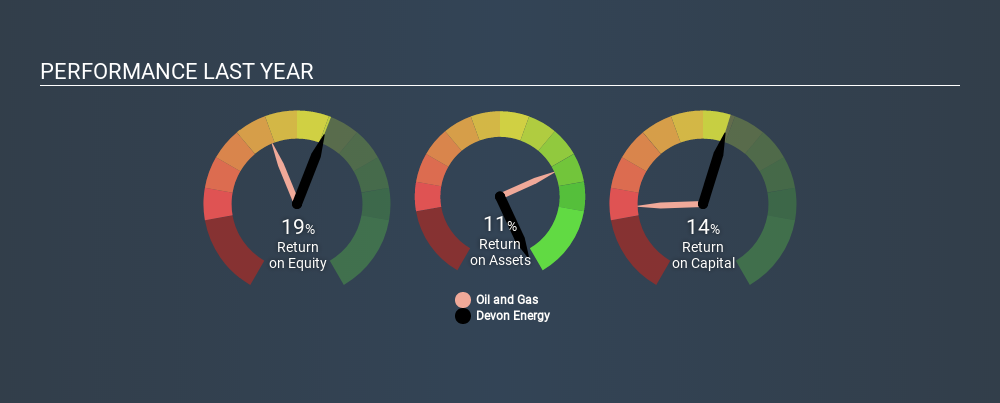
Today we are going to look at Devon Energy Corporation (NYSE:DVN) to see whether it might be an attractive investment prospect. Specifically, we'll consider its Return On Capital Employed (ROCE), since that will give us an insight into how efficiently the business can generate profits from the capital it requires.
First, we'll go over how we calculate ROCE. Second, we'll look at its ROCE compared to similar companies. Finally, we'll look at how its current liabilities affect its ROCE.
Understanding Return On Capital Employed (ROCE)
ROCE measures the amount of pre-tax profits a company can generate from the capital employed in its business. Generally speaking a higher ROCE is better. In brief, it is a useful tool, but it is not without drawbacks. Renowned investment researcher Michael Mauboussin has suggested that a high ROCE can indicate that 'one dollar invested in the company generates value of more than one dollar'.
How Do You Calculate Return On Capital Employed?
The formula for calculating the return on capital employed is:
Return on Capital Employed = Earnings Before Interest and Tax (EBIT) ÷ (Total Assets - Current Liabilities)
Or for Devon Energy:
0.14 = US$1.8b ÷ (US$14b - US$1.7b) (Based on the trailing twelve months to September 2019.)
Therefore, Devon Energy has an ROCE of 14%.
View our latest analysis for Devon Energy
Does Devon Energy Have A Good ROCE?
ROCE can be useful when making comparisons, such as between similar companies. In our analysis, Devon Energy's ROCE is meaningfully higher than the 9.0% average in the Oil and Gas industry. We would consider this a positive, as it suggests it is using capital more effectively than other similar companies. Independently of how Devon Energy compares to its industry, its ROCE in absolute terms appears decent, and the company may be worthy of closer investigation.
We can see that, Devon Energy currently has an ROCE of 14% compared to its ROCE 3 years ago, which was 1.0%. This makes us think the business might be improving. The image below shows how Devon Energy's ROCE compares to its industry, and you can click it to see more detail on its past growth.

When considering ROCE, bear in mind that it reflects the past and does not necessarily predict the future. ROCE can be deceptive for cyclical businesses, as returns can look incredible in boom times, and terribly low in downturns. ROCE is only a point-in-time measure. Given the industry it operates in, Devon Energy could be considered cyclical. What happens in the future is pretty important for investors, so we have prepared a free report on analyst forecasts for Devon Energy.
What Are Current Liabilities, And How Do They Affect Devon Energy's ROCE?
Current liabilities are short term bills and invoices that need to be paid in 12 months or less. The ROCE equation subtracts current liabilities from capital employed, so a company with a lot of current liabilities appears to have less capital employed, and a higher ROCE than otherwise. To counteract this, we check if a company has high current liabilities, relative to its total assets.
Devon Energy has total assets of US$14b and current liabilities of US$1.7b. Therefore its current liabilities are equivalent to approximately 12% of its total assets. A fairly low level of current liabilities is not influencing the ROCE too much.
Our Take On Devon Energy's ROCE
Overall, Devon Energy has a decent ROCE and could be worthy of further research. Devon Energy shapes up well under this analysis, but it is far from the only business delivering excellent numbers . You might also want to check this free collection of companies delivering excellent earnings growth.
For those who like to find winning investments this free list of growing companies with recent insider purchasing, could be just the ticket.
If you spot an error that warrants correction, please contact the editor at editorial-team@simplywallst.com. This article by Simply Wall St is general in nature. It does not constitute a recommendation to buy or sell any stock, and does not take account of your objectives, or your financial situation. Simply Wall St has no position in the stocks mentioned.
We aim to bring you long-term focused research analysis driven by fundamental data. Note that our analysis may not factor in the latest price-sensitive company announcements or qualitative material. Thank you for reading.
About NYSE:DVN
Devon Energy
An independent energy company, engages in the exploration, development, and production of oil, natural gas, and natural gas liquids in the United States.
Undervalued with adequate balance sheet.
Similar Companies
Market Insights
Community Narratives


